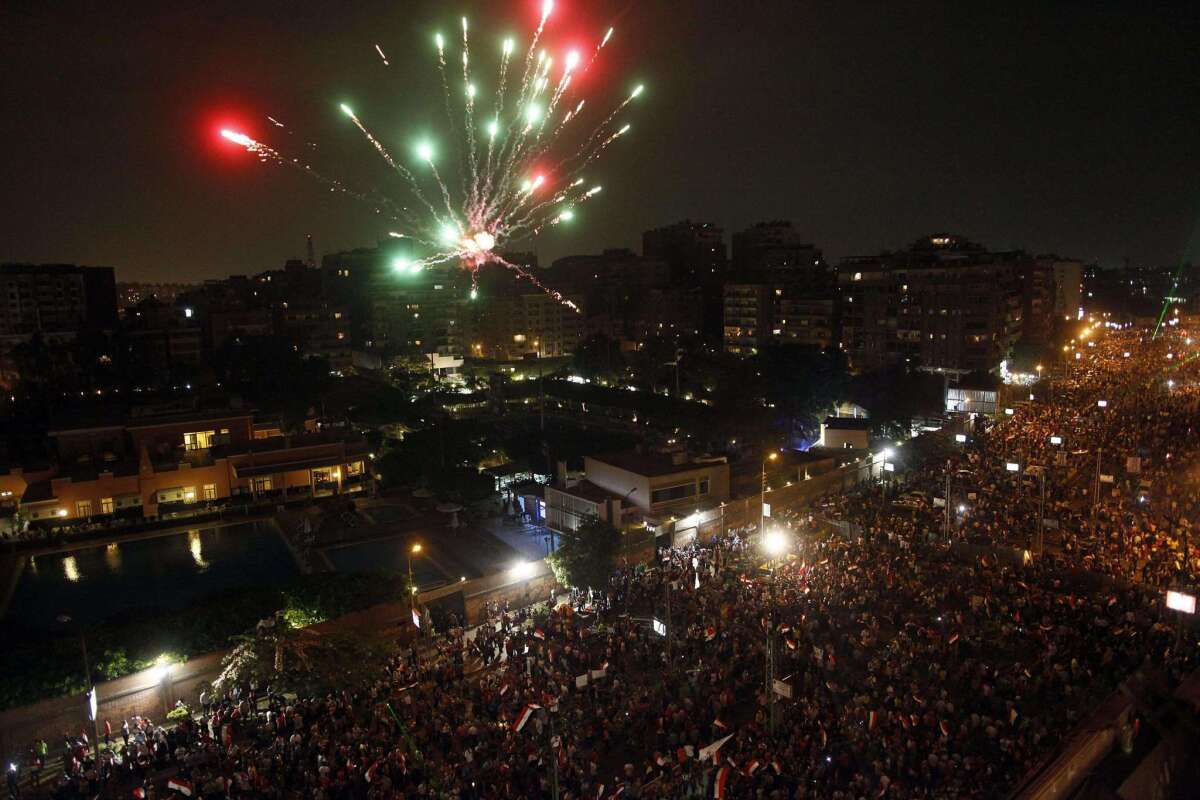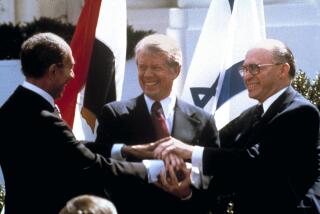Revolution do-over: A rough road ahead for polarized Egyptians

Egyptians despairing of Mohamed Morsi’s Islamist imprint on society have prevailed in ousting the country’s first freely elected president. Faced with a choice between chaos and a coup d’etat, the powerful military opted for the latter.
Whether deposing Morsi leads to calm and a collaborative interim leadership remains to be seen. Prospects for taming the widespread unrest that convulsed Egypt throughout Morsi’s scant year in office seemed no better after the military’s announcement that Morsi was out than in the tumultuous weeks that preceded it.
Reports of Morsi under house arrest and dead-of-night roundups of senior Muslim Brotherhood figures hardly seemed conducive to peace and reconciliation between Egypt’s polarized factions.
Morsi opponents, newly invigorated by legions of youths from the Rebel movement seeking to rewind to the stalled “Arab Spring” of revolution of 2011, cheered the president’s ouster with fireworks and joyous chants through the night at historic Tahrir Square. But just blocks away from the epicenter of the so-called soft coup, thousands of Morsi supporters who had been staging rival demonstrations melted away to evade arrest and nurse their anger for venting another day.
Morsi was said by Egyptian media to have been moved to a place of “political isolation.” Still, he managed through the presidential office’s Twitter account to denounce the move against him as “a full coup.”
Morsi’s fate appeared to have been sealed by his defiant posture a day earlier, when he vowed in a rambling television address to stay in office despite the masses demanding his resignation. The military had warned Monday that if Morsi didn’t work to make peace with the opposition and put an end to the destabilizing protests, the armed forces would step in and do it for him.
Western diplomats and conservative pundits have been quick to bury the “coup” word. What happened in Cairo late Wednesday wasn’t a junta seizing power for the generals, they argue, but a move to save Egypt from the disorder that has paralyzed industry, boosted inflation, worsened fuel shortages and scared away foreign visitors from the pyramids, Nile River cruises and Red Sea resorts.
The Obama administration’s reaction was replete with ambivalence. President Obama said in a statement issued after an hours-long huddle at the White House that he was “deeply concerned by the decision of the Egyptian armed forces to remove President Morsi and suspend the Egyptian Constitution.” He called for a swift restoration of an elected civilian government, but he also seemed to endorse the military action as staying “true to the will of the people” and paving the way for the “honest, capable and representative government” that Egyptians deserve.
The scenes in central Cairo and on television screens around the world were reminiscent of the bedlam in February 2011 that ended in the ouster of longtime autocrat Hosni Mubarak.
But this time, the armed forces chief making the announcement that the president had been removed from power was flanked by top religious, political and social leaders, lending an aura of consensus and inclusion to the outcome.
Defense Minister Gen. Abdel Fattah Sisi announced that Morsi had been replaced by the chief judge of the Supreme Constitutional Court, and that a transitional government of technocrats would be named to run the country until new elections could be held. No date for the balloting redux was mentioned, nor did Sisi make clear what role the military would play.
“The military will lead the transition from behind,” predicted Mohamed Elmenshawy, an Egyptian senior fellow at the Middle East Institute in Washington. “They will make sure through new amendments to the constitution to prevent the establishment of political parties based on religious affiliation.”
While that move would hamper the Islamists’ ability to regain power, Elmenshawy said he doubts that the toppling of Morsi or his religious allies’ exclusion from the political process would provoke a violent backlash.
“The hard-core Islamists are feeling very alienated now. They feel that their victory was hijacked,” Elmenshawy said. “But they aren’t revolutionaries. They don’t like to fight. They didn’t fight for 50 years, even when Mubarak strongly repressed them.”
He expressed concern, though, that the “unfortunately celebratory” mood of Egyptian friends with whom he had spoken after Morsi’s ouster was premature, given the rough road ahead to get a more stable government for roiling Egypt.
Sisi vowed to deal with any violence “decisively,” a clear warning to Morsi’s supporters to keep their anger in check.
With the country deeply polarized between urban and rural, religious and secular, military and civilian, Egypt could be at risk of repeating the electoral outcome of last year when a new presidential vote is held.
Ninety percent of Egypt’s 85 million citizens describe themselves as adherents of Islam. Morsi’s moves to strengthen the political grip of the Muslim Brotherhood’s Freedom and Justice Party had widespread support, although only 24% voted for him in the first round of the presidential election last year. A better reflection of the backing he had for imposing Islamic law, though, was the 64% of voters who approved last year’s constitutional rewrite by an Islamist-dominated assembly.
Whether Wednesday’s dramatic execution of regime change will produce a more representative and secular government will depend on what amendments are made to the suspended constitution and, more important, who in the yet-to-be-named transitional leadership makes them.
ALSO:
Russian opposition mayor detained in bribe scandal
Portugal’s government teeters as Europe debates austerity
U.N. says it is unable to provide urgently needed aid near Damascus
A foreign correspondent for 25 years, Carol J. Williams traveled to and reported from more than 80 countries in Europe, Asia, the Middle East and Latin America.
More to Read
Start your day right
Sign up for Essential California for news, features and recommendations from the L.A. Times and beyond in your inbox six days a week.
You may occasionally receive promotional content from the Los Angeles Times.







